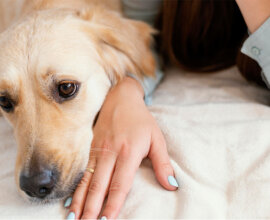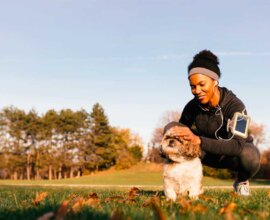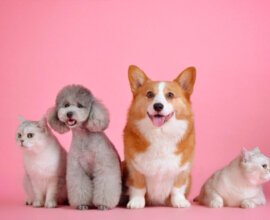Pet Obesity – How to Help Improve Their Health!
It’s Wednesday again, which means that it is time for another #WiseWednesday post! Today, as it’s National Obesity Awareness Day, we thought we would look into the growing problem of pet obesity.
54% of America’s cats and dogs are overweight and it’s a much bigger problem than many people realize. Obesity can lead to a multitude of health issues that can easily be prevented just by keeping your pet fit and at a good weight.
So, let’s take a concise look into the effects of obesity in our pets and how we can combat it. We’ve also included some great recipes for healthy treats below, so be sure to keep reading!
The Ill-Effects of Pet Obesity
A chubby kitty or a plump doggo can be alarmingly cute, there is no question about that! However, it simply isn’t healthy.
Being overweight leads to a much shorter life expectancy, due to the complications it can cause and the increased risk of various diseases.
But on top of all this, an overweight dog or cat experiences a lower quality of life. Being unable to enjoy play sessions or a decent walk anymore, experiencing debilitating health problems, all of this leads to a depressed pet.
How Can We Beat Pet Obesity?
For long term results, a healthy diet is essential.
Low-quality and cheap commercial pet food should be avoided as they commonly contain much less nutritional value than more expensive foods. This means your pet will need to eat more of it each day to satisfy their nutritional requirements, leading to weight gain.
Likewise, table scraps are also a no-no, despite the begging of your pets! Human foods can quickly cause animals to pack on the pounds.
To help you make a start on getting your pets on a better diet, we’ve included recipes for homemade treats below! They’re tasty, fun, and best of all, healthy in moderation.
Blackberry Biscuits for Dogs!
Ingredients:
- 4 cups of almond flour
- ¾ cup of flax meal
- ½ cup of blackberries
- ¼ cup of extra virgin olive oil
- 1 egg
Instructions:
- Preheat the oven to 350 degrees
- Line a baking sheet with parchment paper
- Mix all the ingredients with a cup of water to form a dough
- Roll out the dough until it is ¼ inch thick
- Use a small cookie cutter to cut out biscuits
- Re-roll the remaining dough to cut out more biscuits
- Place your biscuits 1 inch apart on the baking tray
- Bake for 30 minutes until they are nicely brown and firm.
- Wait for them to cool, then serve!
Tuna Treats for Cats!
Ingredients:
- 1 can of Tuna in oil, drained
- 1 egg
- 1 and ¼ cups of flour
- ½ cup of water
- A bottle cap for cutting out the treats!
Instructions:
- Preheat your oven to 350.
- Using a food processor, mix the tuna, egg, flour, and water until a dough forms.
- Roll out the dough to ½ inch thick.
- Cut out biscuits with the bottle cap.
- Bake for 20 minutes on a cookie sheet lined with parchment paper.
- Let it cool and serve!
Thanks to the folks at AKC and Vicky over at More for Less for the recipes!
Let’s Beat Back Pet Obesity Together!
By giving our pets the quality diet they deserve, we can reduce the risk of a shorter lifespan, debilitating health problems, and give them a better quality of life.
Obesity causes many issues, even affecting the quality and sheen of your pet’s coat. You may notice that they look even more beautiful at their ideal weight, and we at Groomit would love to be able to help celebrate their weight loss with a professional grooming session to bring out the absolute best in them. Just let us know!
That concludes this week’s #WiseWednesday post! Check back next week for more valuable content on the blog.
FAQ’s
Q: How do I know if my pet is overweight?
A: There are a few signs that indicate if your pet is overweight. These include difficulty in feeling their ribs or spine, a lack of a defined waistline, a round or bulging appearance, and decreased mobility or stamina. Consulting with a veterinarian can help determine if your pet is overweight.
Q: What are the health risks associated with pet obesity?
A: Pet obesity can lead to various health risks, including diabetes, joint problems, respiratory issues, heart disease, and a shortened lifespan. It can also exacerbate existing conditions such as arthritis. Maintaining a healthy weight for your pet is essential to prevent these health risks.
Q: How can I help my pet lose weight?
A: Helping your pet lose weight requires a combination of diet and exercise. Consult with your veterinarian to develop a weight loss plan tailored to your pet’s specific needs. This may involve adjusting their portion sizes, choosing a balanced diet, incorporating regular exercise, and providing mental stimulation.
Q: Are there any weight loss diets specifically designed for pets?
A: Yes, there are weight loss diets specifically formulated for pets. These diets usually have lower calorie content and higher fiber to help pets feel full while consuming fewer calories. Your veterinarian can recommend the most suitable weight loss diet for your pet based on their age, breed, and overall health.
Q: How can I encourage my pet to exercise?
A: Encouraging your pet to exercise can be done through various activities and interactive play. Engage in regular walks, play fetch, provide puzzle toys, or engage in interactive games with your pet. Gradually increase the duration and intensity of the exercise to improve their fitness level and aid in weight loss.






